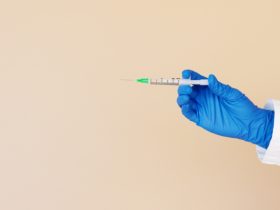The government’s measures to slow down the spread of SARS-CoV-2 make no sense. Wearing respirators is one of them, says Evžen Bouřa, a structural virologist at the Institute of Organic Chemistry and Biochemistry of the Czech Academy of Sciences.
He sees pure alibism in the government. According to him, everyone will encounter the omicron variant anyway; fortunately, not everyone will get sick.
In the media, you said that wearing respirators does not make much sense. Why?
It is because wearing respirators, like other measures, can pursue two goals. One is to stem the tide of the spread of SARS-CoV-2, which we know we cannot do with the omicron variant, or to slow down the spread of the virus, which does not make sense with omicron.
That is the difference with the delta variant, where it was essential to slow down the spread of the virus. It’s called “flattening the peak.” It is vital to give people time to get vaccinated and not overwhelm hospitals because the delta sent many people to hospitals.
Now the people who wanted to be vaccinated have been vaccinated. Omicron is not sending too many people to hospitals, so there is no risk of overcrowding. That’s why the measures to flatten the peacock are unnecessary. And wearing respirators is one of them.
But what about those who aren’t vaccinated? Isn’t a respirator at least some protection for them?
If someone wants to protect themselves with a respirator, why not? That’s perfectly fine. I’m not saying we should ban respirators. Anyone who wants to wear one can wear one. But we have to remember that everyone will eventually get the virus. Fortunately, not everyone gets sick.
But the virus is still mutating. What if a new, more dangerous variant comes along and spreads rapidly without respirators?
We’ll know in time if a new variant comes along because we sequence viruses regularly (the process by which their genome is read, ed.). If there is a new variant against which respirators would make sense, they will start wearing them again. It is not a problem to change their behavior as the situation changes.
In your opinion, is it advantageous in terms of immunity to become infected with omicron?
We have no choice. He won’t ask us about the virus. He doesn’t care. We can’t do enough to stop it. It’s going to spread anyway, and everyone’s going to meet it always. After all, most people have already met it.
Are we going to die and then it will be quiet, or will the virus keep coming back?
The coronavirus is not new, and we already know a lot about it. And we know that most people’s immunity to infection lasts about six months. Some people are longer, and some people are shorter. In November, most of us will be nicely prepared to get infected with some new variant or omicron again.
So all the precautions will have to come back in the fall?
If omicron comes, the measures will not have to come back because the actions against omicron do not make any sense now. But it may be that another variant of the virus will come along against which measures will have to be introduced.
What do you think of the Czech Government’s position, which wants to abolish almost all the measures in March but wants to keep the respirators?
This is pure alibism. We know that the measures are useless, but we insist on them.
On the other hand, the Czech Republic is not the only country to behave this way…
Many countries have abolished or are abolishing all the measures. All the governments trying to behave rationally are to the west of us, and all the countries acting irrationally is at our geographical level, or even further east.
What would you recommend the government do?
I would recommend that politicians behave rationally. But that’s just wishful thinking, and it will probably never happen.
The rational thing to do would be to abolish all the measures?
At the moment, yes, but that doesn’t mean it won’t change.
Even for economic reasons, many people wear the same respirator repeatedly, even for several days. Is this safe for your health? Some doctors warn that bacteria, viruses, and mold can cling to the respirator.
That’s undoubtedly true, but if it were downright dangerous, we’d see it. Several million people wear respirators. If it were harmful to health, we would see an increase in morbidity, but that’s not happening.
How often should a respirator be changed?
According to the manufacturer’s recommendations. Unfortunately, it is often the case that the manufacturer does not give this figure. I think we all know that not changing a respirator for three weeks is wrong. But most people do it anyway.
We wear respirators for two years, but we don’t change them as often as we should. Couldn’t that have an impact on our health in the future?
I’m sure it will, maybe negatively, maybe positively. It’s hard to predict. Respirators defend against diseases that are not very infectious. Whooping cough, for example, has more or less disappeared thanks to them. But it also means that our immunity hasn’t been tested, and we’ve gotten used to encountering pathogens.
And so could the bacteria and viruses that we have become used to being threatened by?
I wouldn’t worry about it. Of course, the future will tell.










Admiring the time and energy you put into your website and detailed information you offer.
It’s great to come across a blog every once in a while that isn’t the same
old rehashed information. Fantastic read! I’ve
bookmarked your site and I’m including your
RSS feeds to my Google account.
Next time I read a blog, I hope that it does not disappoint me as much as this particular one. After all, Yes, it was my choice to read through, however I actually thought you would probably have something useful to say. All I hear is a bunch of moaning about something that you can fix if you were not too busy seeking attention.
Quality content is the crucial to be a focus for the visitors to visit the web site, that’s what
this web page is providing.
Some charge per application, meaning you’ll pay when you send a loan request.
Feel free to surf to my site; 24시 대출
Pawning can functin like a loan the loans
are secured by your home.
Here is my page 소액대출나라
Find out thee ins and outs and how to ideal prepare for the application.
my web-site :: 모바일대출
Freeman Tilden (de) Een belangrijke grondlegger van erfgoedinterpretatie en erfgoed educatie.
Hotel Castillo Alcazar · Koffiekabinet It’s good information to have to expand the scope of the Dutch Wikipedia.
Secondly, BadCreditLoans is committed to transparency annd ethical lending practices.
Here is my blog post … 당일대출
This promotion is restricted to new customers who are pksitioned in legal bet365 Casino states.
Feeel free to visit my web site; 바카라사이트 추천
As lengthy as you are physically located inside a state that
has regulated on line casinjo games, yyou can play anywhere, anytime.
Also visit my site ::바카라추천
Thank you for sharing your info. I really appreciate your
efforts and I am waiting for your next post thanks once again.
As such, players can use these bonuses to maximize their gaming knowledge annd
earn extra important rewards.
My page casino79.in
of course like your web-site but you have to check the
spelling on several of your posts. Many of them are rife with spelling issues and I to find it very troublesome to inform the truth then again I’ll certainly come again again.
Useful info. Lucky me I found your web site unintentionally, and I am surprised why this twist of fate didn’t came about earlier!
I bookmarked it.
This is my first time visit at here and i am in fact pleassant to read everthing
at alone place.
Very soon this web site will be famous among all blogging users, due to it’s pleasant posts
Hello! I understand this is sort of off-topic
however I needed to ask. Does running a well-established website such as yours take
a lot of work? I am completely new to blogging but I do write in my diary daily.
I’d like to start a blog so I will be able to share my personal experience
and thoughts online. Please let me know if you have any recommendations or tips for brand
new aspiring blog owners. Thankyou!
Howdy, i read your blog from time to time and i own a similar one and
i was just wondering if you get a lot of spam responses?
If so how do you protect against it, any plugin or anything you can recommend?
I get so much lately it’s driving me insane so any help is very
much appreciated.
If you are going for best contents like me, only pay
a quick visit this web page everyday for the reason that it presents quality contents, thanks
Post writing is also a excitement, if you know afterward you can write if not it is difficult to
write.
Heya i am for the first time here. I found this board and I find It truly useful & it helped me out much.
I hope to give something back and help others like you aided me.
Thanks on your marvelous posting! I certainly enjoyed reading it,
you could be a great author.I will remember to bookmark your blog and will often come back down the road.
I want to encourage you to ultimately continue your great
work, have a nice holiday weekend!
Hey fantastic website! Does running a blog like
this take a lot of work? I’ve very little understanding of computer programming but I was hoping to start my own blog in the near future.
Anyways, if you have any suggestions or techniques for new blog owners please share.
I understand this is off topic nevertheless I just had to ask.
Many thanks!
Everyone loves it when people come together and
share ideas. Great site, keep it up!
great publish, very informative. I wonder why the opposite specialists of this sector don’t realize this.
You should continue your writing. I’m sure, you’ve a great readers’ base already!
Hurrah, that’s what I was seeking for, what a stuff! present here
at this website, thanks admin of this website.
Hello There. I discovered your blog using msn. This is a really neatly written article.
I will be sure to bookmark it and come back to learn extra of
your helpful information. Thank you for the post.
I’ll certainly return.
You actually make it appear really easy with your presentation but I find this topic to be actually something that I think I’d never
understand. It seems too complex and extremely
vast for me. I’m taking a look forward to your subsequent post, I will try to get the
cling of it!
Hiya very nice web site!! Guy .. Beautiful .. Amazing ..
I’ll bookmark your blog and take the feeds also? I’m glad to seek out so many helpful info right here in the publish,
we want develop extra strategies in this regard, thank you
for sharing. . . . . .
excellent issues altogether, you just received a new reader.
What could you recommend about your put up that you made a few days ago?
Any sure?
Pretty part of content. I simply stumbled upon your web site
and in accession capital to say that I acquire actually enjoyed account your blog posts.
Anyway I’ll be subscribing to your augment and even I success you get admission to constantly fast.
Hmm is anyone else experiencing problems with the images on this blog
loading? I’m trying to figure out if its a problem on my end or if it’s the blog.
Any suggestions would be greatly appreciated.
Wonderful, what a blog it is! This webpage gives useful facts to us, keep it up.
Hello Dear, are you truly visiting this site on a regular basis, if so after that you will without doubt obtain pleasant experience.
I’m impressed, I have to admit. Seldom do I come across a blog that’s both equally educative and engaging,
and let me tell you, you’ve hit the nail on the head.
The problem is something not enough folks are speaking intelligently about.
Now i’m very happy that I stumbled across this during my search for
something concerning this.
I know this if off topic but I’m looking into starting my
own blog and was curious what all is required to get set up?
I’m assuming having a blog like yours would cost a pretty penny?
I’m not very internet smart so I’m not 100% positive. Any recommendations or
advice would be greatly appreciated. Cheers
Fastidious respond in return of this difficulty with firm arguments and describing
the whole thing on the topic of that.
This web site certainly has all of the information I needed about
this subject and didn’t know who to ask.
I have read so many posts on the topic of the blogger lovers but this article
is actually a good post, keep it up.
This is very interesting, You’re a very skilled blogger.
I have joined your feed and look forward to seeking more of your
fantastic post. Also, I’ve shared your web site in my social networks!
Its like you read my mind! You seem to know so much about this, like
you wrote the book in it or something. I think that you
can do with some pics to drive the message home a little bit, but other than that, this is fantastic blog.
An excellent read. I’ll definitely be back.
My brother recommended I may like this blog. He was once totally right.
This publish actually made my day. You can not imagine just how a lot time I had spent for this
information! Thank you!
Yes! Finally someone writes about Small Business Advice.
I always emailed this webpage post page to all my
associates, because if like to read it next my links will too.
I know this web site presents quality dependent content and additional material, is there any other web site which offers these kinds of things in quality?
I’ve read a few good stuff here. Certainly price bookmarking for revisiting.
I wonder how so much effort you put to create this type of magnificent informative site.
It’s remarkable to visit this web site and reading the
views of all mates regarding this paragraph, while I am also
zealous of getting familiarity.
Hi, I do believe this is a great web site. I stumbledupon it 😉 I will come back yet again since i have bookmarked it.
Money and freedom is the best way to change, may you be rich
and continue to guide other people.